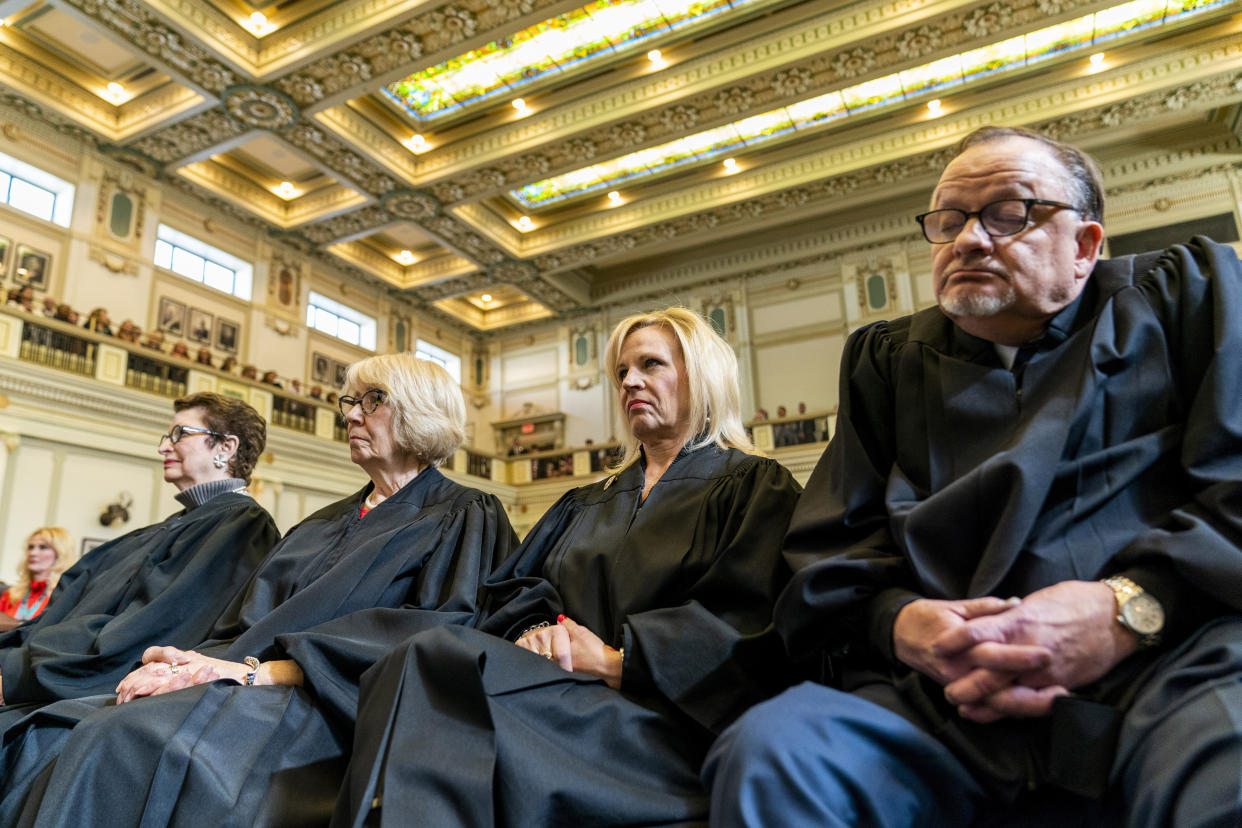Oklahoma high court rejects religious charter school contract

- Oops!Something went wrong.Please try again later.
- Oops!Something went wrong.Please try again later.
The Oklahoma Supreme Court rejected a state contract to open the nation’s first public religious charter school in a lopsided ruling that's unlikely to be the final word in a long legal fight.
Tuesday's 6-2 decision marks a significant victory for Oklahoma Attorney General Gentner Drummond, a Republican who pressed justices in April to reverse a state charter board's approval to open the publicly funded St. Isidore of Seville Catholic Virtual School.
But Republican Gov. Kevin Stitt declared that the court's ruling undermines religious freedom — and said he hopes the case is eventually heard by the U.S. Supreme Court.
"I’m concerned we’ve sent a troubling message that religious groups are second-class participants in our education system," Stitt said Tuesday in a statement. "Religious freedom is foundational to our values, and today's decision undermines that freedom and restricts the choices available to Oklahomans."
Conservative groups have rushed to St. Isidore’s defense with the hope of creating a test case that changes the U.S. Supreme Court’s interpretation of the First Amendment’s Establishment Clause — and clears the way for a new form of public education supporters argue will advance religious freedom and school choice.
The ruling: State justices ordered the Oklahoma Statewide Virtual Charter School Board to rescind its contract with the religious charter school, ruling the agreement is an unconstitutional violation of both state and federal law.
"Under Oklahoma law, a charter school is a public school," justices wrote in the majority's ruling. "As such, a charter school must be nonsectarian. However, St. Isidore will evangelize the Catholic faith as part of its school curriculum while sponsored by the State. This State's establishment of a religious charter school violates Oklahoma statutes, the Oklahoma Constitution, and the Establishment Clause."
The school has been pushing to start operations by July 1. But justices wrote St. Isidore cannot justify its creation by invoking its rights to the free exercise of religion. The school exists because of its charter with the state and would function as a component of Oklahoma's public school system, they said.
A trio of federal Supreme Court rulings that expanded faith-based institutions’ access to public funds also do not apply in St. Isidore's case, the state court's majority said.
"What St. Isidore requests from this Court is beyond the fair treatment of a private religious institution in receiving a generally available benefit, implicating the Free Exercise Clause," justices wrote. "It is about the State's creation and funding of a new religious institution violating the Establishment Clause."
The court further waded into a divisive but unresolved legal question over whether public charter schools qualify under the law as private entities or "state actors" that work on behalf of the government. The Catholic charter school "is a public charter school and a state actor," the majority ruled.
Reactions: “This decision is a tremendous victory for religious liberty," Drummond said in a statement. "The framers of the U.S. Constitution and those who drafted Oklahoma’s Constitution clearly understood how best to protect religious freedom: by preventing the State from sponsoring any religion at all. Now Oklahomans can be assured that our tax dollars will not fund the teachings of Sharia Law or even Satanism."
State religious and political figures nevertheless suggested they would challenge the decision.
"This ruling cannot and must not stand," state school Superintendent Ryan Walters said on Tuesday.
Phil Sechler, senior counsel for the conservative Alliance Defending Freedom legal fund that is representing the state’s charter school board, said his clients would consider all legal options, including appeal.
"The U.S. Constitution protects St. Isidore’s freedom to operate according to its faith and supports the board’s decision to approve such learning options for Oklahoma families," Sechler said in a statement. "The board knew that the First Amendment’s Free Exercise Clause prohibits state officials from denying public funding to religious schools simply because they are religious."
Top Catholic officials in the state also said they are weighing their options.
“Today’s ruling is very disappointing for the hundreds of prospective students and their families from across the state of Oklahoma who desired the educational experience and promise of St. Isidore of Seville Catholic Virtual School," Oklahoma Archbishop Paul Coakley of the Oklahoma City Archdiocese and Bishop David Konderla of the Diocese of Tulsa and Eastern Oklahoma said in a joint statement.

